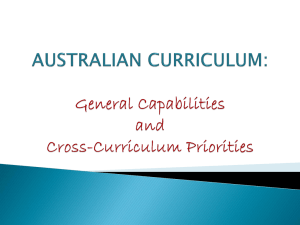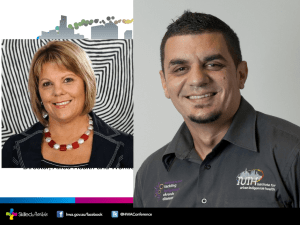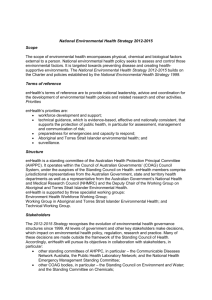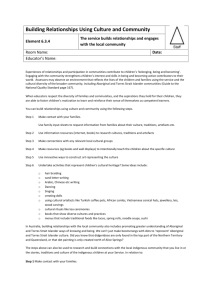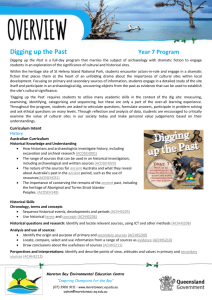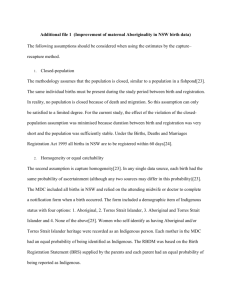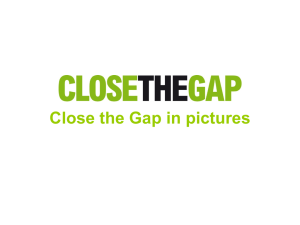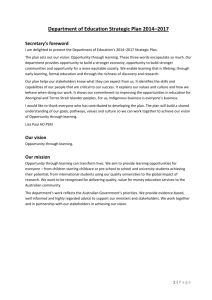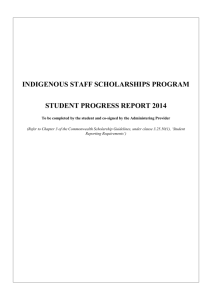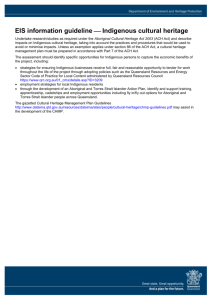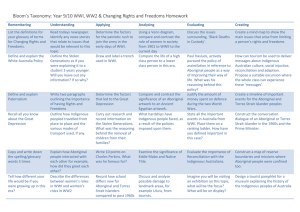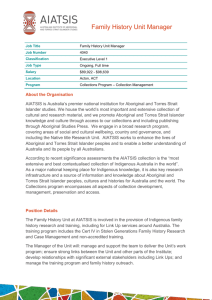This is Our Land*These are Our People
advertisement
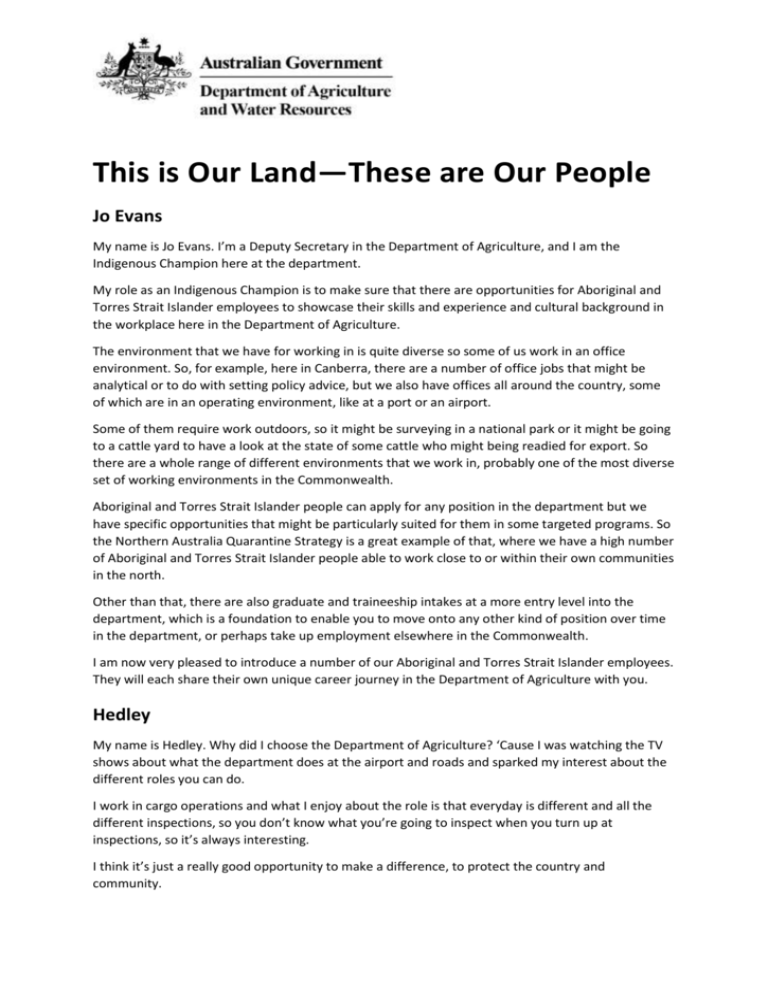
This is Our Land—These are Our People Jo Evans My name is Jo Evans. I’m a Deputy Secretary in the Department of Agriculture, and I am the Indigenous Champion here at the department. My role as an Indigenous Champion is to make sure that there are opportunities for Aboriginal and Torres Strait Islander employees to showcase their skills and experience and cultural background in the workplace here in the Department of Agriculture. The environment that we have for working in is quite diverse so some of us work in an office environment. So, for example, here in Canberra, there are a number of office jobs that might be analytical or to do with setting policy advice, but we also have offices all around the country, some of which are in an operating environment, like at a port or an airport. Some of them require work outdoors, so it might be surveying in a national park or it might be going to a cattle yard to have a look at the state of some cattle who might being readied for export. So there are a whole range of different environments that we work in, probably one of the most diverse set of working environments in the Commonwealth. Aboriginal and Torres Strait Islander people can apply for any position in the department but we have specific opportunities that might be particularly suited for them in some targeted programs. So the Northern Australia Quarantine Strategy is a great example of that, where we have a high number of Aboriginal and Torres Strait Islander people able to work close to or within their own communities in the north. Other than that, there are also graduate and traineeship intakes at a more entry level into the department, which is a foundation to enable you to move onto any other kind of position over time in the department, or perhaps take up employment elsewhere in the Commonwealth. I am now very pleased to introduce a number of our Aboriginal and Torres Strait Islander employees. They will each share their own unique career journey in the Department of Agriculture with you. Hedley My name is Hedley. Why did I choose the Department of Agriculture? ‘Cause I was watching the TV shows about what the department does at the airport and roads and sparked my interest about the different roles you can do. I work in cargo operations and what I enjoy about the role is that everyday is different and all the different inspections, so you don’t know what you’re going to inspect when you turn up at inspections, so it’s always interesting. I think it’s just a really good opportunity to make a difference, to protect the country and community. Keisha My name is Keisha. My current role is that I work with sea ports and import clearance. In our team we get to travel from Wyndham, Kununurra, Groote Eylandt, Broome, just all over the top of Australia. I have been to Japan three times and I have been to the US. Each of those trips involved inspecting US military cargo before it arrives in Australia. I also like the fact that we get to meet a wide range of people, so from all different backgrounds and cultures. Jessica Hi my name is Jessica. Currently I work in a client contact group, answering enquiries, and in cargo inspections, undertaking inspections of imported goods. The concept of protecting the land and its environment sounded like a good reason to go to work. When networking with other government agencies, I have noticed the Department of Agriculture is by far leading in Aboriginal and Torres Strait Islander workplace awareness, staff appreciation, supporting cultural attendance and participating in celebrations of significance. I am proud to be working for our department. James Hello, my name is James Bond. I’m a biosecurity officer here in northern peninsula area. I’m down here at the wharf to meet the ferry that comes over from Thursday Island. Basically our job is to clear all the passengers that come off the ferry and basically ensure that they don’t bring any prohibited items from the quarantine zone over to the mainland. Australia has a unique and beautiful landscape. We need everyone’s help to keep it that way and to protect our way of life Sid My name is Sid. I’m from the great southern region, Western Australia; a small country town call Cranbrook. My current role includes working in Indigenous policy area. I enjoy the opportunities to work across our department’s portfolio and having the opportunities to link that up with Aboriginal communities and Torres Strait Islander communities across regional Australia. The Indigenous Land Tenure Mapping project, which is on the screen here, is one of the most exciting pieces of work that I have been involved in. The MCAS tool has been developed as a decision-making tool that provides Aboriginal and Torres Strait Islander landholders with a tool that they can make future decisions on. Steve My name is Steve and I’m an Aboriginal Kooma man. Lived most of my life in Bundaberg in South East Queensland where I studied horticulture and agriculture. Australian Government Department of Agriculture and Water Resources 2 I first started with the Department of Agriculture as an Indigenous cadet. My current role is as a science research officer in the Australian Bureau of Resource Economics and Science. I like this position because it gives me the opportunity to research information, analyse information and work with primary producer experts. A couple of benefits for me for working for the Department of Agriculture was the flexibility: flexibility with having kids, flexibility with playing sport and flexibility just with personal appointments and that. Martina My name is Martina. I was born in Thursday Island and grew up in Brisbane. I started with the Department of Agriculture in 2007 through the Indigenous traineeship program. I chose the Department of Agriculture because I saw the work they did on the Border Security TV show and thought the work was interesting and I thought that would be very rewarding. Currently I am the Executive Assistant for the Regional Manager in Melbourne. What I enjoy most about the job is the variety of work that I get and the challenges that come with it. The Department of Agriculture values diversity in the workplace. They see the benefits of having people from different backgrounds, experience and perspectives in their workforce. By self identifying our diversity status, we are showing our support for a safe and open environment and we are standing up proud for who we are. Rob My name’s Rob. My main role is GIS officer doing mapping like this. I studied that at university and I just very much enjoy the technical work and the opportunities to get out in the field every now and then. In my role I have been able to travel to remote Indigenous community groups to do consultation. I have also been able to travel to places such as Cairns and Brisbane to work on biosecurity responses, such as the equine influenza and the Asian honey bee incursion. Natarsha My name is Natarsha. I am from Wingham on the mid north coast of NSW. I chose the Department of Agriculture because it was relative to my studies. So I studied a Bachelor of Marine Science and Management and Masters in Environmental Science at the University of New England in Armidale. The graduate program is a great opportunity to learn, to do more training, work-based experience and develop networks throughout the government. Dennis If you are looking for more information about what we do and how we do it, have a look at our informative website or check out the Border Security program. You never know, you might see one of us on there. Australian Government Department of Agriculture and Water Resources 3 Jo Evans The Department of Agriculture is a great place to work. For Aboriginal and Torres Strait Islander people, it also offers the opportunity to work on issues that are related to the land. So I think that is a great combination. Australian Government Department of Agriculture and Water Resources 4
